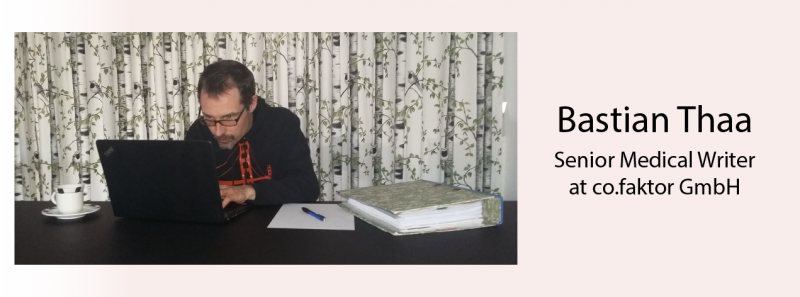
“Use Your Expertise outside the Laboratory”
Name: Bastian Thaa
Did PhD at: Freie Universität Berlin, Germany
Current position: Senior Medical Writer at co.faktor GmbH, Berlin, Germany
Interviewed by: Lifeng Liu
Bastian Thaa, a Senior Medical Writer, got his PhD in Berlin, Germany, in 2011. After his PhD studies, Bastian did his first postdoc in the same laboratory and then did a second postdoc at Karolinska Institutet. He returned to Germany and tried to raise his own money for an independent research project but unfortunately failed. He came back to KI to finish a project that he had started. Publishing this work in PLoS Pathogens was the final achievement on his academic path before he left academia. He got a job in a medical communication agency in Berlin and has been a “Senior Medical Writer” for nearly two years now.
Bastian wanted to stay in academia. While being a PhD student, Bastian always wanted to do a postdoc afterwards. Towards the end of his PhD studies, Bastian and his main PhD supervisor wrote a grant proposal, which was approved and enabled his stay as a postdoc for 3 years in the same group. Those years were productive, as Bastian supervised new PhD students and published a few papers with his group. When this time was coming to an end, Bastian thought it would be good to go abroad. ”Not least because this is generally seen as an advantage and there is funding for doing a postdoc abroad”, he comments. He got a postdoc grant and joined Gerald McInerney’s group at the department of Microbiology, Tumor and Cell Biology (MTC), Karolinska Institutet. This period of time was also very productive with good publications. In addition, he became co-supervisor of two PhD students and contributed to and advanced other projects. He decided to return to Germany after this postdoc period, also for family reasons.
The next logical step in an academic career – getting funds for a project with yourself as a principal investigator – however did not work out for Bastian. “In retrospect, I am aware of a few things that were not ideal. One such thing is certainly that I was restricted geographically. Another reason is that I have never had very influential mentors who would open doors for me that are closed to ordinary researchers. And I have not worked with any of these novel cutting-edge technologies. I suppose you need to be at the right place at the right time and do the right thing”, he reflects, considering these different factors might be helpful for PhD students who want to continue in academia.
Writing about science outside laboratory is what Bastian has been doing after he left academia. Realizing that he had reached the limits of his academic career, Bastian started looking for alternatives. Writing had always been one of his favorite tasks in science. He applied for a position as Medical Writer from a medical communications agency in Berlin. One question he was asked during the interview was “Why do you want to leave academia after having been there for so long?”.
”This was maybe the most difficult obstacle in the job interview. However, I tried to turn this into an advantage, and replied that having a PhD shows that I have successfully managed a big project for several years, and that all these years in academia have given me a substantial amount of experience”.
The main task of Bastian’s job now is writing different kinds of texts for clients in the pharmaceutical industry. These texts are very diverse, for example study publications, case reports, various types of information material for healthcare professionals or patients, as well as regulatory documents for new drugs. “Medical Writing is still quite close to aspects of academic science. Hence, being in academia for so long and having written a lot of scientific texts in all those years certainly helped.”
Writing is an important technique for PhD students. Bastian’s secret for excellent writing is as simply as the way he said “Practice!”. Then he added “The more regularly you write, the more experienced you become, and the easier it gets.” When it comes to writing efficiency, Bastian believes that writing is typically more efficient if you make a plan or an outline before you write the actual text. ”Write down your key messages and then connect them with text. In a research paper, prepare the figures before you write the text that describes what you show in the figures”. He also thinks PhD students benefit from the opportunities for practice when writing regular study reports.
Time passed fast while we were talking. At the end of our conversation, Bastian shared some advice for PhD students. He thinks PhD students should be open for opportunities. “If you plan your professional life too strategically and in too much detail, you may miss some opportunity that you have not considered, or sometimes things may just not work out the way you planned.” In a concluding statement, he emphasizes: “Be aware of your strengths and find out for yourself what you like most about science, research and academia. In my case, it’s writing. Your strengths are not limited to academia, you can always use your expertise outside the laboratory as well. They may open a door for you. Your career will probably not always go straight. Going sideways may be just as good for you.”
Photo: Adapted from original provided by Bastian himself
This career portrait was originally written for the PhD course “Career skills for scientists”, organized every spring by KI Career Service. As explained in the introduction post, all participants in the course interviewed PhD holders with an academic or a non-academic career. Keep an eye on the tags #careerportrait, #InsideAcademia and #OutsideAcademia listed below, for a selection of these portraits. Get inspired and learn more about your options for your post-PhD career!

0 comments